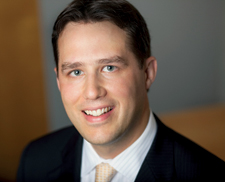A Spanish proverb says give a man fish, feed him for a day. Teach a man to fish, feed him for a life.

So where there is poverty, there needs to be more than a helping hand that provides temporary assistance. People in need often must have immediate health services. But can someone find a small business model that could help people escape a vicious cycle of illness and joblessness?
That model is what Portware president and chief operating officer Scott DePetris hoped to find with his charity efforts. He wanted to help create a new program in the poor neighborhood just north of his. It started for him when he first questioned what happened on the other side of 96th Street.
For many years, on the east side of Manhattan, 96th Street has been a kind of dividing line between affluent and poor New York, between Yorkville and East Harlem. DePetris, who lives about a quarter mile south of 96th Street, had been active in several charities. But he wanted to be more directly involved in changing people’s lives. How could he improve the lives of those who lived north of 96 Street, where he knew poverty rates were high and health problems numerous?
East Harlem has eight times the infant mortality rate as the rest of Manhattan. So how, DePetris thought, can one help? He wanted a charity model that would incorporate entrepreneurial elements, programs that would give people better health, but also self-sufficiency.
Then a few years ago, a fellow alum of Fairfield University told DePetris about the Little Sisters of the Assumption (LSA) Family Health Service, which works with East Harlem residents.
The order of the Little Sisters of the Assumption began in France. Its mission is "serving God and loving the poor and marginalized." In 1958, a few sisters of the order began operations on East 115th Street, with a small staff that included nurses and a social worker.
DePetris was impressed. He immediately became a supporter of the non-profit group. And today he is board vice chairman.
"Their approach is very different than a lot of other organizations in New York. It’s a holistic approach, a family-oriented approach," he says. This strategy provides skilled home nursing that includes pre-natal help, programs that combat asthma-another scourge of East Harlem-as well as adult education, GED and English as a Second Language programs.
In 2011, the program, with a 70-person staff, served some 2,600 individuals through various programs.
The group also has a thrift store that helps people buy necessities at discounts. It has a food pantry, play groups, a children’s music group, after-school tutoring, mentoring for teenagers and a nutrition program that teaches kids to cook healthy meals with foods found in neighborhood bodegas.
But DePetris and his colleagues wanted to add their touch; they want to help promote economic institutions in East Harlem.
"We took the store and we created a co-op out of it. And what that allowed us to do is to create the entrepreneurial spirit with the folks that LSA Family Health Service helps and teach them the basic kind of skills that you need to operate a business," DePetris says.
The board has taken a service store and turned it into a part of an economic development partnership with the East Harlem community, according to DePetris, noting it wants to expand the idea to another store.
What’s so special about a thrift store?
"Community members can come in," he adds. "They can be part of the co-op. They can learn how to price goods. And they learn about inventory management and budgeting." These are skills that people can use in many ways in their professional and personal ways, DePetris says.
The goal, he adds, is for recipients of the services to learn business skills that will make them independent of the program. Indeed, it is the crowning glory of the program when former recipients themselves start helping the family health center, DePetris says. He believes that his group can create a virtuous circle that can expand.
"Scott DePetris has brought a passion to his work with our group. He has given passionate speeches and has worked hard to help us. He has gotten a lot of people interested in us," says Gary S. Carter, executive director of LSA Family Health Service.
This model of helping people to help themselves is now being considered by other non-profit agencies throughout the city. DePetris is both proud and happy that a big part of his life is now north of 96th Street.




